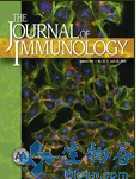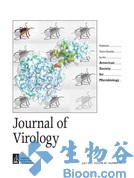J Immunol:博卡病毒VP2蛋白能调控宿主天然免疫反应
2013-07-03 武汉病毒研究所 武汉病毒研究所
近期,中科院武汉病毒研究所王汉中课题组在人博卡病毒(HBoV)调控宿主天然免疫反应机制的研究中取得重要进展。研究表明,HBoV的结构蛋白VP2能够通过抑制I型干扰素通路上的负反馈调节因子RNF125来增强IFN-b生成。相关结果已发表于国际免疫学期刊The Journal of Immunology上。 大量的临床研究表明,HBoV主要感染两岁以下的婴幼儿,并常与其它呼吸道病毒混合感染。HBoV
近期,中科院武汉病毒研究所王汉中课题组在人博卡病毒(HBoV)调控宿主天然免疫反应机制的研究中取得重要进展。研究表明,HBoV的结构蛋白VP2能够通过抑制I型干扰素通路上的负反馈调节因子RNF125来增强IFN-b生成。相关结果已发表于国际免疫学期刊The Journal of Immunology上。
大量的临床研究表明,HBoV主要感染两岁以下的婴幼儿,并常与其它呼吸道病毒混合感染。HBoV阳性的患者常伴随呼吸道疾病与肠道疾病,尽管已经报道了至少两例HBoV单一感染致死性病例,但目前尚无证据表明HBoV能够致病。HBoV入侵常引起宿主普遍的体液免疫及细胞免疫反应,但其如何调控宿主天然免疫的研究甚少。本课题组发现在仙台病毒(SeV)或Poly(dA-dT)刺激后,HBoV的VP2能够通过IRF3通路增强IFN-b的生成。其主要机制为:VP2与RIG-I的负反馈调节因子RNF125结合并抑制RNF125介导的RIG-I的泛素化降解,从而导致IFN-b持续产生。
本研究揭示了HBoV调控宿主免疫反应的新机制,并具体阐述了一种病毒基因表达导致的IRF3信号异常激活的机制,从而为研究HBoV的致病机理提供理论依据。
该研究得到了国家“973”项目和国家自然科学基金的支持

doi:10.4049/jimmunol.1202933
PMC:
PMID:
Human Bocavirus VP2 Upregulates IFN-β Pathway by Inhibiting Ring Finger Protein 125–Mediated Ubiquitination of Retinoic Acid–Inducible Gene-I
Huanle Luo*, Zhenfeng Zhang*, Zhenhua Zheng*, Xianliang Ke*, Xiaowei Zhang*, Qian Li*, Yan Liu*, Bingke Bai†, Panyong Mao†, Qinxue Hu* and Hanzhong Wang*
Precise regulation of innate immunity is crucial for maintaining optimal immune responses against infections. Whereas positive regulation of IFN signaling elicits rapid type I IFNs, negative regulation is equally important in preventing the production of superfluous IFNs that can be hazardous to the host. The positive regulators of IFN pathway are known to be the main targets of viruses to antagonize the innate immune system. Whether viruses target the negative regulators of IFN pathway remains to be fully investigated. In this study, we report that the structural protein VP2 of human Bocavirus modulates IFN pathway by targeting the ring finger protein 125 (RNF125), a negative regulator of type I IFN signaling, which conjugates Lys48-linked ubiquitination to retinoic acid–inducible gene-I (RIG-I) and subsequently leads to the proteasome-dependent degradation of RIG-I. VP2 not only upregulated Sendai virus (SeV)–induced IFNB promoter activity, but also enhanced SeV-induced IFN-β production at both mRNA and protein levels. In agreement, the level of Ser396-phosphorylated IFN regulatory factor 3 stimulated by SeV was enhanced in the presence of VP2. Furthermore, VP2 was demonstrated to physically interact with RNF125, resulting in the reduction of RNF125-mediated ubiquitination and proteasome-dependent degradation of RIG-I. Additional study indicated that endogenous RIG-I degradation was decreased in VP2-expressing cells. Our study delineates a unique phenomenon for aberrant activation of IFN regulatory factor 3 pathway and may represent a new mechanism underlying viral manipulation of the host immune system.
本网站所有内容来源注明为“梅斯医学”或“MedSci原创”的文字、图片和音视频资料,版权均属于梅斯医学所有。非经授权,任何媒体、网站或个人不得转载,授权转载时须注明来源为“梅斯医学”。其它来源的文章系转载文章,或“梅斯号”自媒体发布的文章,仅系出于传递更多信息之目的,本站仅负责审核内容合规,其内容不代表本站立场,本站不负责内容的准确性和版权。如果存在侵权、或不希望被转载的媒体或个人可与我们联系,我们将立即进行删除处理。
在此留言












#免疫反应#
53
#宿主#
66
#天然免疫#
64